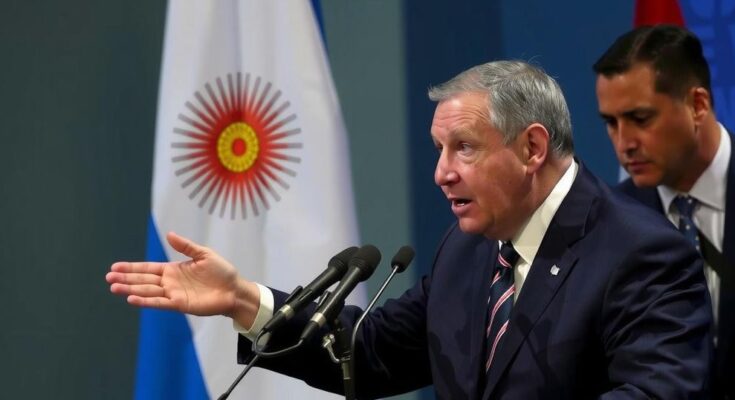Argentina’s President Javier Milei dismissed Foreign Minister Diana Mondino shortly after the nation voted to support lifting the U.S. embargo on Cuba at the U.N. This decision reflects Milei’s administration’s commitment to a foreign policy that denounces human rights abuses, even as he maintains alignment with U.S. and Israeli interests, significantly diverging from broader Latin American opposition to Israel’s actions. The government has announced plans for an internal audit to address potential dissenting agendas within the Foreign Affairs Ministry.
On Wednesday, Argentina’s President Javier Milei dismissed Foreign Relations Minister Diana Mondino after the nation voted in favor of lifting the U.S. economic embargo on Cuba during a session at the United Nations General Assembly. Subsequently, Gerardo Werthein, the Argentine ambassador to the United States, has been appointed as the new foreign minister. The President’s spokesman, Manuel Adorni, did not specify the reasons for this dismissal, but the timing suggests a strong correlation to the aforementioned vote. In a press release, the President’s office stated, “Our country is categorically opposed to the Cuban dictatorship, and it will remain firm in promoting a foreign policy that condemns all regimes that perpetuate the violation of human rights and individual freedoms.” Argentina joined a coalition of 187 nations in favor of a U.N. resolution that condemned the U.S. embargo against Cuba, contrasting sharply with the positions of only the United States and Israel, who voted against it. Since assuming office in December 2023, President Milei has shifted Argentina’s foreign policy in alignment with the interests of the United States and Israel. He has notably expressed unyielding support for Israeli Prime Minister Benjamin Netanyahu amid ongoing controversies surrounding Israel’s military actions in Gaza. This stance diverges significantly from that of several Latin American nations, including Bolivia and Colombia, which have severed relations with Israel, while at least five other countries, including Brazil, have withdrawn their ambassadors. The dismissal of Mondino reflects a tumultuous period in her tenure as Foreign Minister, which has been marked by several controversies including a recent misstep involving the naming of the Falkland Islands as the “Falklands” rather than “Malvinas,” the term preferred in Argentina. Moreover, during a visit to China aimed at enhancing bilateral ties, she faced backlash for an insensitive remark about the physical appearance of the Chinese populace. In light of these events, the Milei administration has indicated its intention to conduct an internal audit at the Foreign Affairs Ministry to identify individuals promoting agendas at odds with the principles of freedom.
Argentina’s recent political landscape has been characterized by significant shifts in foreign policy under President Javier Milei, who has sought to align more closely with U.S. and Israeli interests since taking office in December 2023. The country’s recent vote at the U.N. to lift the U.S. embargo on Cuba highlights a conflicting approach towards international relations, reflective of a larger regional trend where some Latin American countries are distancing themselves from Israel in light of its military strategies. The controversies surrounding former Foreign Minister Diana Mondino further underscore the challenges and criticisms faced by the current administration regarding its foreign policy stances, particularly in relation to human rights.
In conclusion, the dismissal of Foreign Minister Diana Mondino by President Javier Milei following Argentina’s vote to lift the U.S. embargo on Cuba underscores the administration’s commitment to a foreign policy that prioritizes opposition to regimes perceived as violating human rights. The swift change in leadership within the Foreign Relations Ministry illustrates the delicate balance the Milei government seeks to maintain amidst contradictory international pressures and regional alignments. The forthcoming internal audit of the ministry suggests a rigorous approach to understanding and aligning foreign policy with the administration’s principles.
Original Source: www.mymotherlode.com




